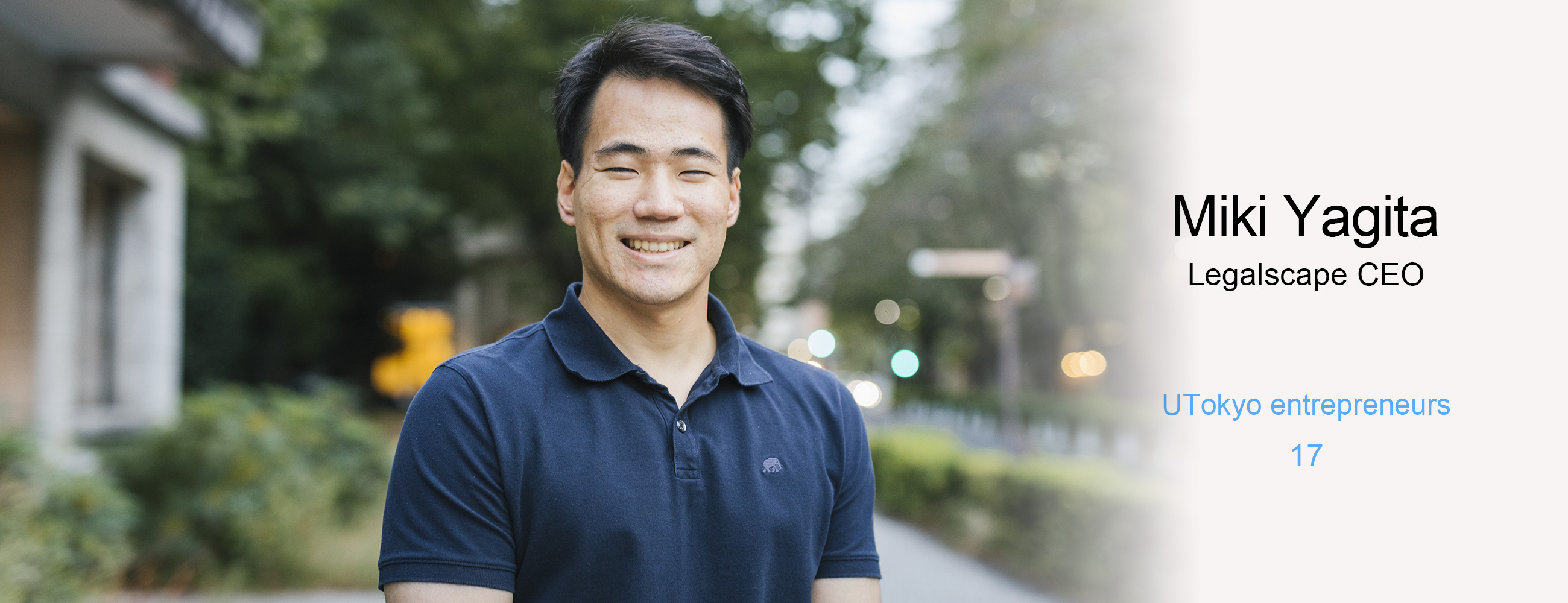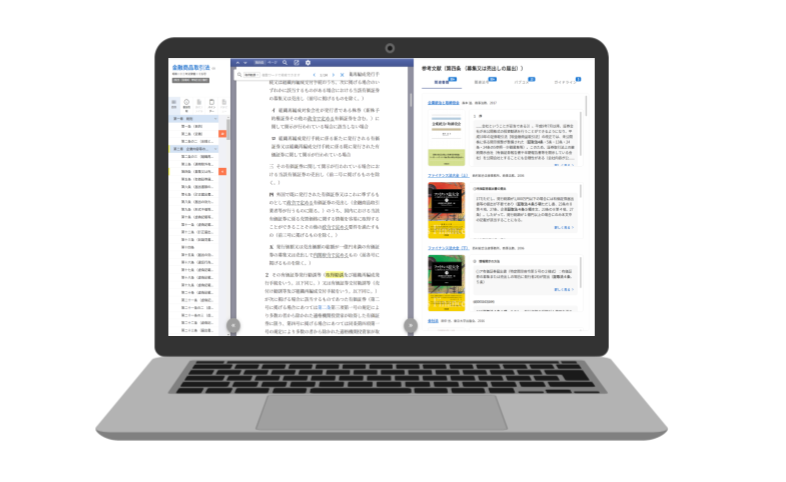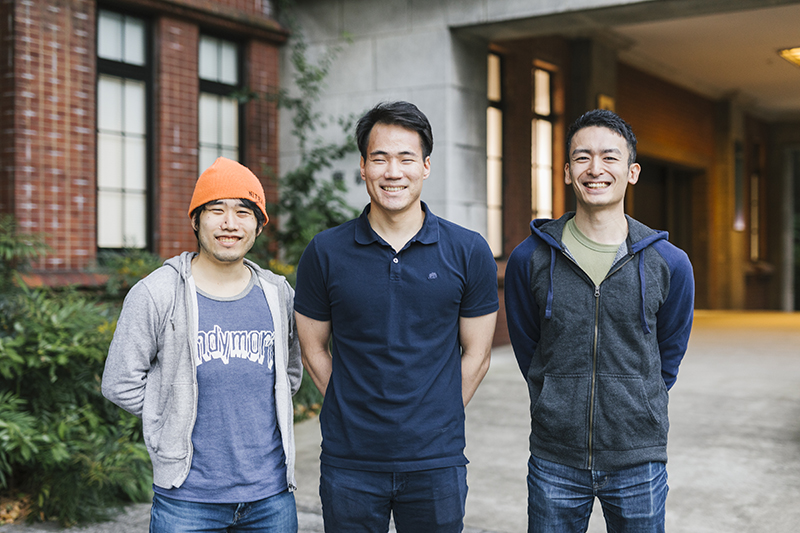Digitalizing Japan’s legal world Entrepreneurs 17

This series introduces entrepreneurs who have received startup support from UTokyo programs or who have utilized university research. UTokyo’s support aims to expand Japan’s innovation ecosystem.

As a master’s student at the University of Tokyo’s Graduate School of Information Science and Technology, Miki Yagita was astonished to learn just how far Japan’s legal world lags behind when it comes to digitalization. Although Japanese courts hand down rulings in roughly 200,000 civil cases annually, a mere 1 percent of the relevant documents are released in digital form.
At that time, Yagita was gathering data from among the limited number of digitalized ruling documents available on court websites across the country. His aim was to build a search engine for judicial precedents through the use of natural language processing — a research subject he took up at the Department of Computer Science. “I thought either there was no demand for such a search engine, or that nobody had realized that such a system is actually needed,” Yagita recalled.
The answer came from a veteran in the legal world whom Yagita happened to meet just before he completed his degree program. “He told me that if such a technology were established, it could definitely be applied to various aspects of the legal world,” Yagita said. “His remarks gave me confidence that the technology I was studying could be used for the betterment of society.” Six months after completing his master’s degree in March 2017, Yagita founded Legalscape, Inc., with him as CEO, and Yusuke Kido, who was a student in the same program with Yagita, as chief technology officer.
The Tokyo-based startup is now offering a system that lets users search and view legal data it has collected by applying natural language processing, which uses artificial intelligence (AI) to analyze and understand human language. The company hopes to advance the digital transformation (DX) of Japan’s legal world, which is said to be 20 years behind the U.S. and Europe in terms of digitalization.
In 2021, Legalscape launched the official version of its legal information search and viewing system. The system has been adopted by major legal firms for legal research, as well as by corporate legal affairs departments at major companies such as alcoholic beverage maker Suntory Spirits Ltd. and global conglomerate Mitsubishi Corp. Yagita has now set his sights on bringing DX to every aspect of the legal process, from lawmaking (drafting and revising laws at government ministries and agencies) to the use of legal information (searching and viewing legal information by legal professionals and corporations’ legal affairs departments).
Internship, overseas experience instill confidence
Yagita admits that when he entered the master’s program, he wasn’t very interested in research. He decided to explore a research subject from the perspective of how computer science can be used to better society. He eventually came up with a topic that had attracted little attention in the computer science field. “I have some relatives who are lawyers, so I thought I would be able to seek their advice if I need it,” Yagita said with smile. Once he started his research, he was quickly fascinated by it.
Yagita said that becoming an entrepreneur wasn’t his goal when he entered the master’s program. But his thinking gradually changed after joining some internship programs. He first took part in an internship at an information technology giant for two months. Due to the size of the organization, he felt that he was working at a level far removed from the decision-making process. He then had an internship at a startup, where he learned that at a small organization it is possible to have a say in making decisions.
After he met the aforementioned legal veteran, Yagita decided to decline a job offer from a consulting firm. That made him the only member of his class not lined up with a job or a place in a doctoral program upon graduation.
Yagita may have developed the confidence to stray from the beaten path when he was a teenager. “I lived in Perth, Australia, from when I was 11 to 15,” he said. “Even though I could not speak English at all, my parents made me attend a local school. But I eventually managed to overcome that hardship. Come to think of it, my mentality that I can deal with almost anything, even if I stray from the conventional path, was probably instilled in me at that time.”
Bringing DX to legal world, corporate legal affairs

The official version of Legalscape, released in June 2021, is capable of searching and viewing not only various laws, but also books that explain hard-to-understand aspects of laws. Users have instant access to the exact sections of the documents and books that they want to view, which can drastically reduce the time required for legal research. The system has a database of more than 1,100 books — with more scheduled to be added — that users can view for reference, thanks to collaboration with publishers.
The public and private sectors, meanwhile, have teamed up to discuss how to digitalize information related to rulings in civil cases and make them available to the public so that corporations and researchers can make the best use of them. Legalscape, for its part, has joined a project team tasked with making legal information available as open data, which anybody can access and use. The team was launched by the Japan Law Foundation, the research arm of the Japan Federation of Bar Associations.
Yagita said major issues involved in releasing information related to civil case rulings are how to protect the privacy and trade secrets of the parties involved. Releasing legal information online by disclosing proper nouns (i.e., names) that reveal identities could have adverse effects by exposing those involved in a civil case to unwanted attention and undue scrutiny.
To address this problem, Legalscape has developed a system that conceals and protects private information by using AI to automatically mask proper nouns and other sensitive information with symbols, but preserving the identities and making them distinguishable throughout a court ruling document. “Of course, we humans have to check the document afterwards, but the system allows us to shorten the time required to anonymize court ruling documents to one-tenth of what it would take to do that manually,” Yagita said.
Making legal information available as open data means increased competition in the legal research market. Yagita welcomes this. “It is important to provide better services through competition,” he said. Yagita is determined to help bring DX to all aspects of making and using legal information in Japan, and possibly providing information in English in the future to give non-Japanese firms easy access to the country’s legal information.

Legalscape, Inc.
Established by CEO Miki Yagita and Chief Technology Officer Yusuke Kido in 2017, the startup was selected for the MITOU Program by the Information-technology Promotion Agency the same year. In 2018, the company was selected for the 1stRound incubation program by UTokyo Innovation Platform Co., Ltd., a wholly-owned subsidiary of UTokyo, and also procured 30 million yen in funding from Coral Capital, a venture capital firm. (Yagita said the company becoming profitable at an early stage may have led to complacency and prevented it from developing a competitive spirit at the outset.) The startup uses an office at the Entrepreneur Lab on UTokyo’s Hongo Campus provided by the Division of University Corporate Relations. Besides the two executives, the company now has 10 staff members, including five engineers. The startup plans to expand by hiring more staff, with the aim of further promoting DX of legal information.
Date of interview: Oct. 27, 2022
Interview/Text: Yumiko Mori
Top and bottom photos: Kohei Hara






